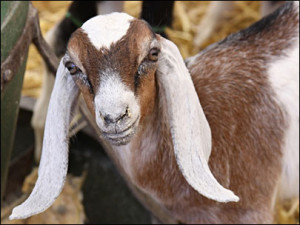Landline can now reveal at least 24 people have contracted Q fever during an ongoing outbreak on a Victorian goat dairy farm. While the farm owners and health authorities seem to have stemmed the flow of people falling ill, they have not been able to stop the spread of the disease among the animals. Prue Adams reports.
 PRUE ADAMS, REPORTER: There’s a picture perfect quality to this farmland near Ballarat. Lambs at foot, bluestone buildings and at this time of year, golden canola. It’s a region that also boasts one of the biggest dairy goat farms in the country. The only clue to an underlying problem here are the warnings on the front gate.
PRUE ADAMS, REPORTER: There’s a picture perfect quality to this farmland near Ballarat. Lambs at foot, bluestone buildings and at this time of year, golden canola. It’s a region that also boasts one of the biggest dairy goat farms in the country. The only clue to an underlying problem here are the warnings on the front gate.
SANDY CAMERON, GOAT FARM OWNER: The first thing is we’ve had to restrict access to the property, signs up saying “Don’t Enter”. Of course, being in the country, people are fairly used to ignoring signs, so then we – you’ve actually got to try and enforce that.
(Present) When Landline caught up with the Camerons in 1997, they were only producing sheep milk and cheese. Later that year, they got into goats. And now, in addition to milking thousands of sheep, they also milk 5,000 goats twice daily. This is a big enterprise with three dairies and employing 100 staff. Four years ago, some of those employees started getting sick.
SANDY CAMERON: In 2011, we had a few people get Q fever, including our daughter, but we didn’t know it was Q fever. Even though they went to doctors, we didn’t know what was going on. It was late-2012 before one of the staff had it diagnosed as Q fever. In hindsight we realised it was during 2012 was the main incidence of staff being infected.
SIMON FIRESTONE, UNIVERSITY OF MELBOURNE: It was sounding very significant from the start. So historically in Victoria, the Health Department receives notifications of about 30 cases of Q fever a year, and in one week, they’d five notified associated with the one farm property. So, yeah, that was an outbreak. That was clearly an outbreak smacking us in the face.
PRUE ADAMS: In 2013, Dr Simon Firestone, a senior veterinary lecturer at Melbourne University, was one of several authorities notified.
SIMON FIRESTONE: It’s the largest farm-associated outbreak in Australia’s history. So we’ve had large abattoir-associated outbreaks and a large single outbreak where there were 25 cases previously at a saleyard in South Australia in 2004. But, yeah, at 24 cases, this is – this is the largest by far of any of the single farm-associated outbreaks and then, as with all of these, there would be cases that have gone undiagnosed.
